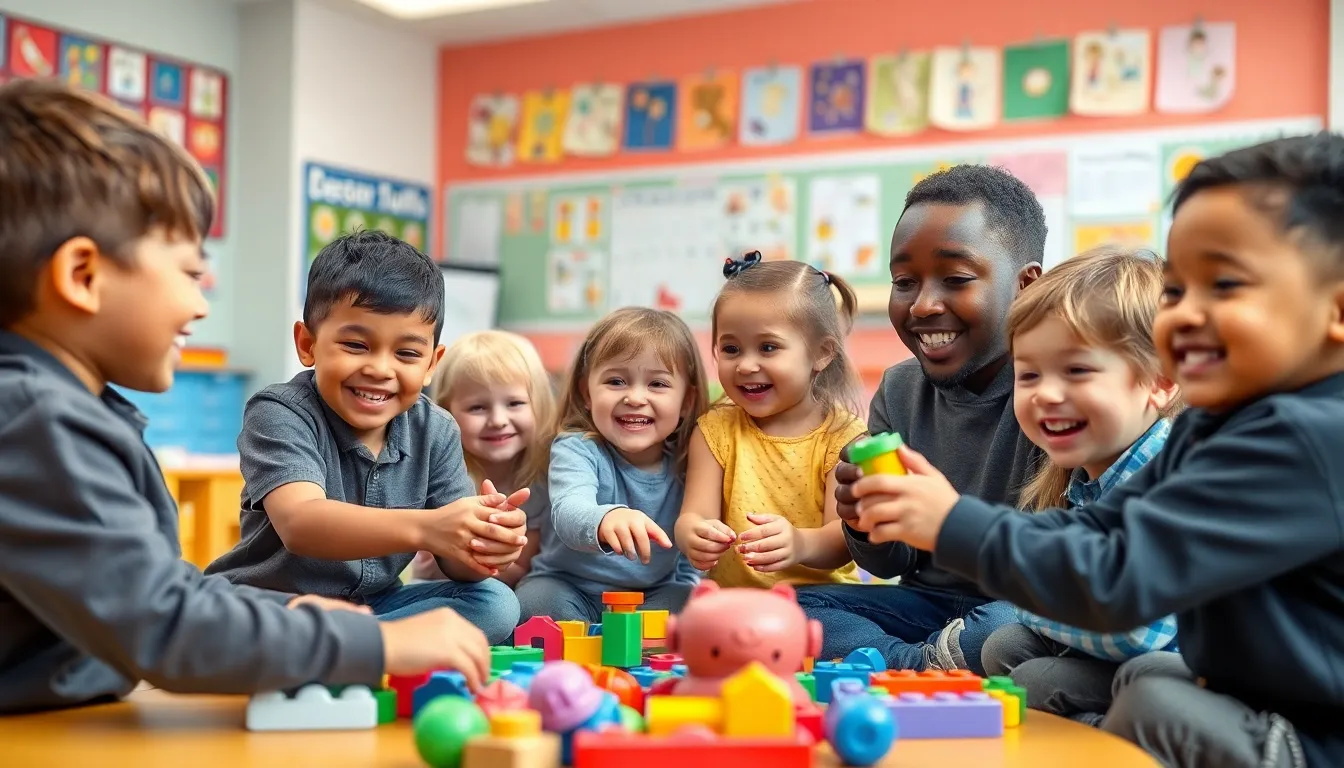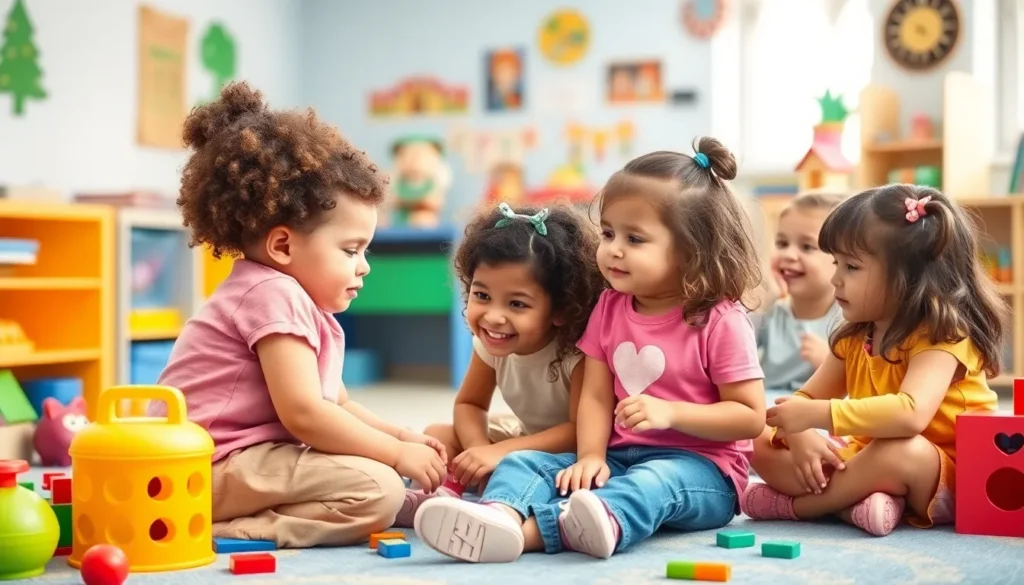Table of Contents
ToggleIn a world that thrives on connection, fostering empathy in preschoolers is more important than ever. At this tender age, children are like sponges, absorbing lessons about emotions and relationships. Understanding how to nurture empathy can shape their social interactions and emotional intelligence for years to come.
Preschool is a critical time for children to learn about feelings—both their own and those of others. By cultivating empathy early, parents and educators can help kids develop essential skills that promote kindness, cooperation, and resilience. This article explores practical strategies to encourage empathy in preschool settings, ensuring that children grow into compassionate individuals ready to face the complexities of life.
Understanding Preschool Empathy
Empathy in preschoolers shapes their emotional and social development. Recognizing emotions in themselves and others fosters positive interactions that lay the foundation for future relationships.
Definition of Empathy
Empathy refers to the ability to understand and share the feelings of another person. In preschoolers, this manifests as compassion and sensitivity towards peers’ emotions. For example, a child who sees a classmate crying may feel sadness and respond with comfort. This skill develops gradually, starting from recognizing basic emotions and advancing to more complex feelings, such as empathy for someone else’s joy or distress.
Importance of Empathy in Early Childhood
Empathy significantly impacts preschoolers’ social interactions and emotional growth. Research shows that children with strong empathetic skills display better cooperation and problem-solving abilities. Developing empathy leads to:
- Enhanced relationships: Empathetic children build stronger, healthier friendships.
- Improved communication: Understanding others’ emotions promotes effective dialogue.
- Reduced aggression: Empathy often correlates with lower instances of bullying and conflict.
- Increased altruism: Empathy encourages sharing and helping behaviors among peers.
Cultivating empathy during early childhood sets a positive trajectory for personal and social development, equipping children with essential tools for navigating complex social environments.
Factors Influencing Preschool Empathy

Various factors significantly influence the development of empathy in preschool children. Understanding these elements helps caregivers foster a more supportive environment for nurturing empathy.
Family Environment
Family dynamics play a crucial role in shaping a child’s empathetic responses. Children raised in supportive environments, where emotional expression is encouraged, tend to demonstrate higher levels of empathy. Consistent modeling of empathetic behavior by parents or caregivers lays a foundation for children to imitate. Engaging in discussions about feelings, both their own and others’, further deepens their understanding of empathy. Research shows that children exposed to warmth and open communication within the family unit are more likely to develop strong emotional and social skills.
Peer Interactions
Early peer interactions critically impact the cultivation of empathy. Through experiences with friends and classmates, preschoolers learn to navigate emotions and social cues. Positive peer relationships, characterized by sharing and cooperative play, enhance a child’s ability to recognize and respond to the feelings of others. Learning to resolve conflicts and offer support among peers fosters empathy while promoting emotional intelligence. Various studies indicate that active engagement in group activities, such as cooperative games or collaborative projects, boosts preschoolers’ empathetic behaviors.
Teaching Preschool Empathy
Teaching preschool empathy involves engaging children in activities and creating environments that cultivate emotional understanding. This developmental focus aids in forming compassionate social interactions and emotional intelligence among young children.
Activities to Foster Empathy
- Storytime Discussions: Read age-appropriate books that highlight emotions and relationships. Discuss characters’ feelings to encourage children to express empathy.
- Role-playing Games: Use scenarios where children can act out different emotions and perspectives. This practice nurtures compassion as they step into others’ shoes.
- Emotion Charades: Have children depict various emotions through facial expressions and body language. This game deepens their understanding of emotions and promotes empathetic responses.
- Kindness Projects: Organize group activities that involve helping others, like creating cards for nursing homes. Working together to support others fosters a sense of community and empathy.
- Sharing Circles: Implement regular sharing sessions where children express their feelings and listen to peers. These discussions create a safe environment for emotional expression.
Role of Educators and Caregivers
Educators and caregivers play a vital role in teaching empathy. They model empathetic behavior through their interactions and responses. Encouraging open discussions about feelings and emotions helps children articulate their experiences.
- Modeling Empathy: Demonstrate empathy in everyday interactions. Show understanding and compassion when addressing children’s needs or conflicts.
- Encouraging Reflection: Ask children reflective questions about their feelings and the feelings of others. This practice enhances their ability to recognize and respond to different emotions.
- Creating Empathetic Environments: Establish classrooms or play areas that promote cooperation and understanding. Design activities that require teamwork and problem-solving.
- Providing Support: Offer guidance in conflict resolution. Teaching children how to navigate disagreements empathetically prepares them for future social interactions.
- Recognizing Empathetic Behavior: Praise and acknowledge instances when children express empathy. Recognition reinforces the importance of understanding others’ feelings in building relationships.
Assessing Preschool Empathy
Assessing empathy in preschoolers involves various methods that capture emotional understanding and social behavior. Accurate assessment allows parents and educators to identify strengths and areas for development in children’s empathetic skills.
Methods of Measurement
- Observational Assessments: Observing children in naturalistic settings, such as during play or group activities, provides insights into their empathetic interactions. Educators note instances of sharing, comforting peers, or responding to others’ emotions.
- Parent and Teacher Reports: Questionnaires and surveys from parents and teachers can gauge children’s empathetic behaviors in different environments. Tools like the Empathy Questionnaire assess children’s ability to recognize and respond to others’ feelings.
- Structured Activities: Engaging children in role-playing scenarios or storytelling can measure their empathetic responses. For example, asking children to act out scenarios involving conflict resolution allows evaluators to see how children empathize with different perspectives.
- Peer Feedback: Gathering feedback from peers in a preschool setting may reveal children’s relationships and how effectively they express empathy. Peer assessments can highlight behaviors that promote or hinder emotional connections.
Challenges in Assessment
- Variability in Expression: Children express empathy differently based on personality and context, making it difficult to create a standardized measurement. Individual differences mean that what appears as a lack of empathy in one child may signify a different emotional processing style.
- Cognitive Development: Preschoolers are still developing cognitive skills necessary for understanding complex emotions. This stage can complicate assessments, as children’s capacity for empathy may fluctuate as they grow.
- Influence of Environment: Environmental factors, such as family dynamics and cultural attitudes toward emotional expression, can impact empathetic behaviors. Evaluators must consider these influences when interpreting assessment results.
- Limited Self-Awareness: Young children may lack the self-awareness to accurately reflect on their emotional responses. This limitation can affect the reliability of self-reported measures of empathy.
By utilizing varied methods and recognizing potential challenges, accurate assessments of preschool empathy can inform effective strategies for enhancing emotional development in young children.
Fostering empathy in preschoolers is essential for their social and emotional development. By creating supportive environments and encouraging open discussions about feelings, parents and educators can significantly impact children’s ability to connect with others. Engaging in activities that promote understanding and compassion helps preschoolers build meaningful relationships and enhances their emotional intelligence.
As they learn to navigate their emotions and those of their peers, children become more resilient and cooperative. The skills they develop during these formative years lay the foundation for a lifetime of empathetic interactions. Investing in empathy education today prepares children to thrive in their social environments tomorrow.




